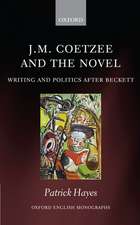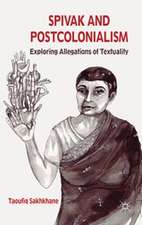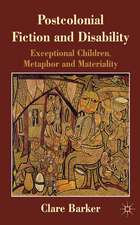Dissident Writings of Arab Women: Voices Against Violence: Routledge Advances in Middle East and Islamic Studies, cartea 23
Autor Brinda J. Mehtaen Limba Engleză Hardback – 10 feb 2014
The female authors destabilize essentialist framings of Arab identity through a series of reflective interrogations and "contesting" literary genres that include novels, short stories, poetry, docudramas, interviews and testimonials. Rejecting a purist "literature for literature’s sake" ethic, they embrace a dissident poetics of feminist critique and creative resistance as they engage in multiple and intergenerational border crossings in terms of geography, subject matter, language and transnationality. This book thus examines the ways in which the women’s writings provide the blueprint for social justice by "voicing" protest and stimulating critical thought, particularly in instances of social oppression, structural violence, and political transition.
Providing an interdisciplinary approach which goes beyond narrow definitions of literature as aesthetic praxis to include literature’s added value as a social, historical, political, and cultural palimpsest, this book will be a useful resource for students and scholars of North African Studies, Postcolonial Studies, Francophone Studies, and Feminist Studies.
| Toate formatele și edițiile | Preț | Express |
|---|---|---|
| Paperback (1) | 447.51 lei 6-8 săpt. | |
| Taylor & Francis – 3 iun 2016 | 447.51 lei 6-8 săpt. | |
| Hardback (1) | 1063.31 lei 6-8 săpt. | |
| Taylor & Francis – 10 feb 2014 | 1063.31 lei 6-8 săpt. |
Din seria Routledge Advances in Middle East and Islamic Studies
-
 Preț: 311.41 lei
Preț: 311.41 lei -
 Preț: 310.65 lei
Preț: 310.65 lei -
 Preț: 409.69 lei
Preț: 409.69 lei - 14%
 Preț: 338.33 lei
Preț: 338.33 lei -
 Preț: 409.69 lei
Preț: 409.69 lei -
 Preț: 493.80 lei
Preț: 493.80 lei - 16%
 Preț: 297.57 lei
Preț: 297.57 lei -
 Preț: 482.56 lei
Preț: 482.56 lei - 18%
 Preț: 892.33 lei
Preț: 892.33 lei -
 Preț: 389.38 lei
Preț: 389.38 lei -
 Preț: 482.74 lei
Preț: 482.74 lei -
 Preț: 386.00 lei
Preț: 386.00 lei -
 Preț: 489.30 lei
Preț: 489.30 lei - 28%
 Preț: 820.03 lei
Preț: 820.03 lei -
 Preț: 406.81 lei
Preț: 406.81 lei -
 Preț: 447.51 lei
Preț: 447.51 lei -
 Preț: 417.96 lei
Preț: 417.96 lei -
 Preț: 392.60 lei
Preț: 392.60 lei -
 Preț: 414.32 lei
Preț: 414.32 lei - 17%
 Preț: 270.61 lei
Preț: 270.61 lei -
 Preț: 408.74 lei
Preț: 408.74 lei -
 Preț: 493.80 lei
Preț: 493.80 lei -
 Preț: 407.40 lei
Preț: 407.40 lei - 25%
 Preț: 323.35 lei
Preț: 323.35 lei -
 Preț: 416.22 lei
Preț: 416.22 lei - 18%
 Preț: 1162.84 lei
Preț: 1162.84 lei - 18%
 Preț: 1057.09 lei
Preț: 1057.09 lei -
 Preț: 412.79 lei
Preț: 412.79 lei
Preț: 1063.31 lei
Preț vechi: 1296.72 lei
-18% Nou
Puncte Express: 1595
Preț estimativ în valută:
203.53€ • 221.15$ • 171.07£
203.53€ • 221.15$ • 171.07£
Carte tipărită la comandă
Livrare economică 21 aprilie-05 mai
Preluare comenzi: 021 569.72.76
Specificații
ISBN-13: 9780415730440
ISBN-10: 0415730449
Pagini: 292
Dimensiuni: 156 x 234 x 25 mm
Greutate: 0.7 kg
Ediția:1
Editura: Taylor & Francis
Colecția Routledge
Seria Routledge Advances in Middle East and Islamic Studies
Locul publicării:Oxford, United Kingdom
ISBN-10: 0415730449
Pagini: 292
Dimensiuni: 156 x 234 x 25 mm
Greutate: 0.7 kg
Ediția:1
Editura: Taylor & Francis
Colecția Routledge
Seria Routledge Advances in Middle East and Islamic Studies
Locul publicării:Oxford, United Kingdom
Public țintă
Postgraduate and UndergraduateNotă biografică
Brinda J. Mehta is the Germaine Thompson Professor of French and Francophone Studies at Mills College in Oakland, California, where she teaches postcolonial African and Caribbean literatures, contemporary French literature, and transnational feminist theory. She is the author of; Notions of Identity, Diaspora and Gender in Caribbean Women’s Writing (2009); Rituals of Memory in Contemporary Arab Women’s Writing (2007); and Diasporic (Dis)locations: Indo-Caribbean Women Writers Negotiate the Kala Pani (Winner of the Frantz Fanon Award, 2007).
Recenzii
Brinda Mehta’s Dissident Writings of Arab Women: Voices against Violence is a timely engagement with an understudied topic. Focusing in particular on the diaspora and sites of displacement, she brings into the discussion of feminist dissent a powerful insight that is substantiated throughout with blueprint material and documentation. Going beyond the condescending manner that blighted a portion of the feminist critique, she delves into writings and documents that present Arab women’s struggle through art, literature , and other public sphere activity to interrogate forms and types of violence that have targeted women populations. But rather than devising ethnic and genderic divides, the effort in this book is focused on manifestations of violence as strategies and methods that cannot be seen outside the colonial and imperial onslaught. The postcolonial scriptoria is expanded and enriched beyond the colonial encounter. Building up its strong argument across languages and borders, this book is a serious and well-documented contribution to the study of feminist dissent.
Muhsin al-Musawi, Professor of Arabic Literature, Columbia University
Muhsin al-Musawi, Professor of Arabic Literature, Columbia University
Cuprins
Introduction; Part 1 Violence and war; Chapter 1 Contesting violence and imposed silence; Part 2 Violence and social/sexual oppression; Chapter 2 Sexual violence and testimony; Chapter 3 Gendering the Straits; Chapter 4 Writing from the banlieue; Part 3 Staging violence in North African women’s theatre; Chapter 5 Madness as political dissent in Jalila Baccar’s Junun; Chapter 6 The darker side of Tahrir in Laila Soliman’s No Time for Art and Blue Bra Day; conclusion Conclusion;
Descriere
Dissident Writings of Arab Women: Voices Against Violence analyzes the links between creative dissidence and inscriptions of violence in the writings of a selected group of postcolonial Arab women.
The female authors destabilize essentialist framings of Arab identity through a series of reflective interrogations and "contesting" literary genres that include novels, short stories, poetry, docudramas, interviews and testimonials. Rejecting a purist "literature for literature’s sake" ethic, they embrace a dissident poetics of feminist critique and creative resistance as they engage in multiple and intergenerational border crossings in terms of geography, subject matter, language and transnationality. This book thus examines the ways in which the women’s writings provide the blueprint for social justice by "voicing" protest and stimulating critical thought, particularly in instances of social oppression, structural violence, and political transition.
Providing an interdisciplinary approach which goes beyond narrow definitions of literature as aesthetic praxis to include literature’s added value as a social, historical, political, and cultural palimpsest, this book will be a useful resource for students and scholars of North African Studies, Postcolonial Studies, Francophone Studies, and Feminist Studies.
The female authors destabilize essentialist framings of Arab identity through a series of reflective interrogations and "contesting" literary genres that include novels, short stories, poetry, docudramas, interviews and testimonials. Rejecting a purist "literature for literature’s sake" ethic, they embrace a dissident poetics of feminist critique and creative resistance as they engage in multiple and intergenerational border crossings in terms of geography, subject matter, language and transnationality. This book thus examines the ways in which the women’s writings provide the blueprint for social justice by "voicing" protest and stimulating critical thought, particularly in instances of social oppression, structural violence, and political transition.
Providing an interdisciplinary approach which goes beyond narrow definitions of literature as aesthetic praxis to include literature’s added value as a social, historical, political, and cultural palimpsest, this book will be a useful resource for students and scholars of North African Studies, Postcolonial Studies, Francophone Studies, and Feminist Studies.


























